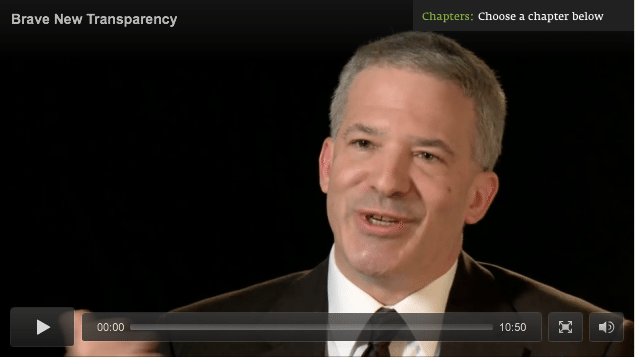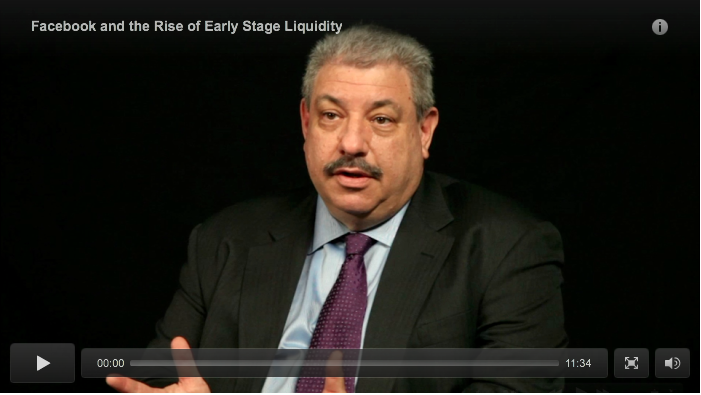Disparity Versus Liquidity
In the venture capital market, nearly everyone is an insider, which is why the SEC is taking a hard look at the explosion of private share exchange activity.

If I said “insider trading,” your first thought would likely be Raj Rajaratnam of Galleon Group, or maybe Charlie Sheen in “Wall Street.” You are likely to think first of stocks and publicly traded securities, because such securities are traded prodigiously and mostly be people who have no access whatsoever to decision makers within the corporate issuers.
You are unlikely to think of private equity or venture capital, because shares in private companies do not “trade,” at least not in the NYSE sense. And yet markets for buying and selling private shares have gained incredible momentum over the past two years, altering the image of the private investment market as a landscape of frozen-granite illiquidity. As the initial wave of mostly social-media secondary transactions takes place, there is a risk that a separate and unequal market is being created – on the one side is a small collection of investors who know exactly what is going on, and on the other side is a huge collection of individual punters who profoundly do not. And the one side is selling to the other.
The overseers of the public markets have a hard-enough time policing issues related to information disparity, in which a handful of insiders can exploit an unfair advantage over the vast a majority of stakeholders. Imagine the task of policing insider trading in a market where the majority of owners tend to be insiders, with a minority of outsiders buying in through intermediaries. Such is the task of the Securities and Exchange Commission as it takes a lookat growing activity on private share exchanges.
It is worth noting here that insider trading prohibitions apply to public and private securities alike, although enforcement actions against traders of private securities are nearly non-existent. The Securities Exchange Act of 1934 states that “[i]t shall be unlawful for any person. . . to omit to state a material fact. . . in connection with the purchase or saleof any security” (emphasis mine).
Even if you wanted to, until very recently it would have been difficult to be an inside trader in the private investment market. Most shares change hands in privately negotiated transactions, in which case the onus is on the buyer to perform due diligence and come up with his or her own judgment as to value. You couldn’t simply get a phone call with a hot tip from your VC buddy and then go snap up a million shares in a start-up.
Such impulsive trading is still impossible, but a handful of new liquidity specialists, such as SecondMarket and SharesPost, are making it easier to buy and sell private shares.
If what these private share exchanges are offering is a better way to manage liquidity programs for private company executives and investors, it is easy to see how an everyday accredited investor might get the idea that such services are more like a pre-IPO Nasdaq. A visit to the SharesPost homepage reveals a table listing sexy names like Facebook, LinkedIn and Twitter, with three columns marked “Buy,” “Sell,” and “Last Contract” (users must register to see this information).
The increased demand for buying into later-stage, venture backed companies is being met with pent-up demand for liquidity. Many of the early investors in, and founders of, prominent private companies would like to take some money off the table. Less famous than the social media hits are the thousands of other venture-backed companies that have spent years in search of a liquidity event. Venture capital as an institutional asset class is nearly at a crisis stage because of a lack of exits. If the buyers who now swarm SharesPost find shares in Twitter to be too rich, they may be tempted by less-heralded names on offer, and from sellers who are experiencing a 10-year itch.
The trouble in these circumstances is that nearly every holder of private shares in venture-backed companies has access to material inside information about the financial health and direction of the businesses.
Even investors who have no board or executive role at the corporate level are often given board “observations rights,” meaning the ability to sit in on board meetings. In negotiations, “Major investors sometimes get observation rights,” says a partner at a prominent law firm. “This is usually so they can get a general sense about whether the company is going in a positive direction, and to retain a constant watch on the investment.”
Such access recently made the news in a Henry Blodget-authored report on Business Insider. Blodget detailed supposed Silicon Valley consternation at investor John Doerr’s having recently sat in on a Twitter board session. Doerr’s firm, Kleiner Perkins Caufield & Beyers, is a later-stage investor in Twitter but it does not have a board seat. According to the report, Doerr does have observation rights at Twitter. At issue is Doerr’s board seat at Google, which has in the past expressed an interest in acquiring Twitter and which may yet launch products in direct competition with Twitter.
An original version of the article stated that Kleiner Perkins had sold shares in Twitter, and it raised the possibility that the transaction was done with the benefit of Doerr’s insider access. A subsequent note clarified that the shares were merely transferred to another Twitter investor and at a price unchanged from Kleiner Perkin’s original investment.
A Kleiner Perkins “quick flip” would certainly have raised eyebrows, if it had happened, given Doerr’s access to discussions inside the board room.
Clearly other shareholders in prominent venture-backed companies are selling at huge profits, and with the benefit of access to information that the club-like VC world affords.
The SEC is now reportedly looking into private-share exchange activity to sniff out conflicts of interest. In the meantime, venture-backed companies that want to take advantage of new liquidity options will need to develop the kinds of compliance programs more often seen among public corporations. This means placing restrictions around share sales by anyone with access to insider information. Informally, it also means playing hide-the-ball with anyone who has observation rights. It is a well known secret that boards will often have one conversation for observers and another for true closed-door sessions. In this and other ways, the rise of private share exchanges may ultimately change the venture culture from one of inter-peer openness to one of guarded exchanges, closed doors and policed emails.
In the venture capital market, nearly everyone is an insider, which is why the SEC is taking a hard look at the explosion of private share exchange activity, writes David Snow

